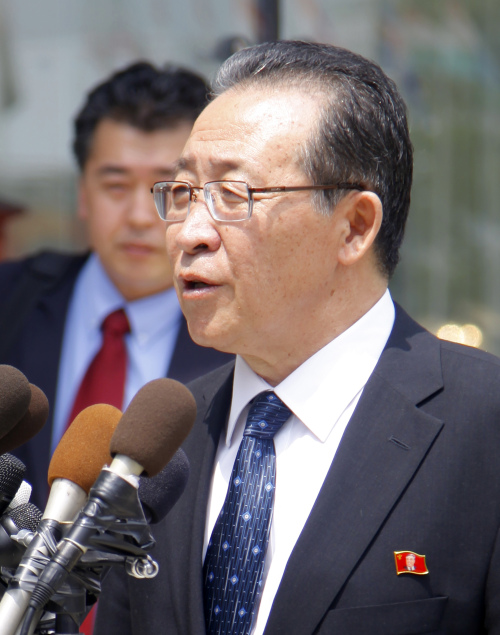Regional powers likely to increase small-scale contact
The six partners of the stalled regional dialogue aimed at denuclearizing North Korea are expected increase small-scale contact in the following weeks after Washington and Pyongyang made a breakthrough in their recent talks, analysts and officials here said Sunday.
Two days of rare talks between the U.S. and North Korea ― the first in 19 months ― ended Friday with both sides describing them as constructive and meaningful.
The six partners of the stalled regional dialogue aimed at denuclearizing North Korea are expected increase small-scale contact in the following weeks after Washington and Pyongyang made a breakthrough in their recent talks, analysts and officials here said Sunday.
Two days of rare talks between the U.S. and North Korea ― the first in 19 months ― ended Friday with both sides describing them as constructive and meaningful.

Meeting with reporters after his talks with former U.S. Ambassador Stephen Bosworth, Pyongyang’s Vice Foreign Minister Kim Kye-gwan said the talks had been “very constructive and businesslike.”
“We continue to maintain contacts,” he said.
Bosworth said later his government would “consult with Seoul as well as other dialogue partners” about the suspended six-nation talks before taking further steps.
Analysts and officials in Seoul take Bosworth’s comments as a sign that the six parties will increase bilateral and trilateral contact to reach a preliminary consensus on the condition of the new talks rather than jump straight into the process of reviving the talks on a full-scale basis.
“We have many remaining obstacles to tackle down before the six-party talks reopen,” a high-ranking official in Seoul said on the condition of anonymity. “To get a clear picture on the future process, we’ll be seeing many more rounds of talks among us.”
Kim Yong-hyun, a North Korean expert at Seoul’s Dongguk University, said the long-stalled multinational talks could restart within the next three to four months should North Korea “continue efforts to keep up the current mood.”
“Talks between the North and the U.S. and the inter-Korean dialogue should go together,” he said.
The six-nation denuclearization talks, which opened in 2003 under the suggestion of China, broke down at the end of 2008 as Pyongyang left the talks insisting that other dialogue partners had failed to provide it with the aid they had promised. The communist North conducted its second nuclear test shortly afterwards, prompting the U.S. to slap it with additional sanctions.
Reportedly suffering from deepening food shortages in the recent months, Pyongyang has been making an effort to rejoin the talks that involve the two Koreas, the U.S., China, Japan and Russia.
But Seoul and Washington have been insisting that Pyongyang must first make a proper effort to mend ties with South Korea following the two deadly attacks it conducted last year.
Signs of positive changes were first detected during surprise talks between chief nuclear envoys of the two Koreas during a recent regional security forum held in Indonesia.
For the current process to move forward, Pyongyang is asked to put into action its commitment under a 2005 agreement to abandon all nuclear weapons and allow the return of outside inspectors to its land. Washington also wants the North to halt its ongoing uranium enrichment activities it views as potentially dangerous.
Should North Korea agree to commit to these processes, it would be able to stabilize relations with the U.S. as well as other regional powers, secure food aid and energy assistance, as well as pledge from Washington that its troops won’t attack Pyongyang.
During the talks with Pyongyang last week, Washington appears to have reiterated the importance of seeing better inter-Korean ties, making sure its longstanding ally is not left out in the process, Seoul officials said.
Seoul has long feared losing the initiative in solving the issues related to the peninsula as North Korea often attempted to ostracize its southern rival by holding talks directly with Washington.
Sending Cho Hyun-dong, deputy head of its six-way talks team, to New York for consultations with the U.S. before the Pyongyang-U.S. talks last week, South Korea made an apparent effort to play a role in the much-veiled discussions.
“All I can say for now is that we delivered our position on various issues to make sure that inter-Korean ties remain at the core of this process,” the unnamed Seoul official said. “The ball is now in the court of Pyongyang.”
Recognizing the importance of keeping close with other dialogue partners, South Korean Foreign Minister Kim Sung-hwan is scheduled to visit Russia Aug. 6-9 to discuss pending issues including that on North Korea and the six-party talks, according to the Foreign Ministry here.
By Shin Hae-in (hayney@heraldcorp.com)










![[Today’s K-pop] BTS pop-up event to come to Seoul](http://res.heraldm.com/phpwas/restmb_idxmake.php?idx=644&simg=/content/image/2024/04/17/20240417050734_0.jpg&u=)





![[KH Explains] Hyundai's full hybrid edge to pay off amid slow transition to pure EVs](http://res.heraldm.com/phpwas/restmb_idxmake.php?idx=652&simg=/content/image/2024/04/18/20240418050645_0.jpg&u=20240419100350)

